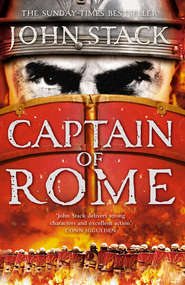По всем вопросам обращайтесь на: info@litportal.ru
(©) 2003-2025.
✖
Masters of the Sea Trilogy: Ship of Rome, Captain of Rome, Master of Rome
Автор
Год написания книги
2019
Настройки чтения
Размер шрифта
Высота строк
Поля
The legionary stopped four feet short of Atticus and stood to attention, raising his right fist and slamming it into his chest, a salute to the captain of the ship standing before him. The sound of the soldier’s fist against chain mail sounded unnaturally loud in the quiet of the morning. The silence was shattered, a silence needed to ensure the Aquila remained undetected. As the legionary drew himself to his full height in anticipation of addressing a senior officer, Atticus reacted.
‘Beg to report, Captain,’ the legionary declared in a strident voice. As per regulation, he was looking straight ahead, but his eyes dropped quickly as the captain suddenly lunged at him, his expression murderous. The soldier tried to react but the movement was too quick and he felt the captain’s hand close over his mouth.
‘Keep your voice down, you whoreson,’ Atticus hissed. ‘Are you looking to have us all killed?’
The legionary’s eyes widened in surprise and alarm as both his hands wrapped themselves around the captain’s wrist in an attempt to ease the pressure over his mouth. Panic flared as he realized that the grip was vicelike, the muscles in the captain’s arm like iron, the pressure unrelenting. Atticus relaxed his hold a little and the legionary gulped air into his lungs, dread still in his eyes which moments ago had showed only confidence. Atticus removed his hand, his face expressing the warning for silence that needed no vocal manifestation.
‘I, I …’ the legionary spluttered.
‘Easy soldier,’ said Atticus, ‘breathe easy.’
As if for the first time, Atticus noticed how young the legionary was, barely eighteen at most. Septimus, the marine centurion, had twenty such hastati under his command. Fresh from the barracks, and before that a Roman family, these boys had eagerly signed on at sixteen to fulfil their duty as Roman citizens.
‘The centurion …’ the soldier began haltingly, ‘the centurion wishes to speak with you.’
‘Tell him I cannot leave the foredeck.’
The soldier nodded, as if the effort to speak was too much. He straightened up slowly.
‘Yes, Captain.’
Once again he stood to attention, though not as sharply as before. He began to salute but stopped short of hitting his chest, his eyes locked on those of Atticus.
‘I’m sorry, Captain … about before …’
‘No shame, soldier, now report to the centurion.’
The legionary did an about-face and marched off, although this time with a softer step. Atticus watched him leave and smiled to himself. Ever since Septimus had come aboard the Aquila ten months ago, he had tried to impose his will on Atticus. As captain, Atticus was responsible for the ship and its crew of sailors, while Septimus was responsible for the reduced century of sixty marine infantry stationed on board. The ranks were, to all intents and purposes, equal, and it was the responsibility of both men to maintain the status quo between the commands. Atticus turned and took up his position at the bow of the trireme. He instinctively checked the line of his ship, satisfying himself that the four rowers, two fore and two aft, were keeping the trireme midstream. He became motionless again, rock steady, refocusing all his senses on the task at hand. As suddenly as it had blown up, the onshore breeze disappeared, robbing the Aquila of that additional advantage, shifting the odds again, this time in favour of the prey.
Septimus stood tall at the front of his assembled century in the aft section of the main deck. At six foot four inches and two hundred and twenty pounds he was a formidable sight. The centurion stood with his feet slightly apart, balancing himself against the gentle rolling of the deck, his right hand resting lightly on the hilt of his gladius, his left arm encircling his helmet. His dark Italian features were accentuated by a tangle of black curly hair, giving him a permanently dishevelled look.
The centurion had been standing ready since before dawn, over two hours in full battledress. The waiting never bothered Septimus. Over his twelve-year career as a Roman infantryman, he had developed the endless patience of the professional soldier. He began his career not long after the Battle of Beneventum, when the Roman legions finally routed the army of Pyrrhus of Epirus, the Greek aggressor who had sought to subdue Rome and expand his kingdom across the Adriatic. Where before the legions would have been disbanded after a campaign, the ferocity and swiftness of Pyrrhus’s attack persuaded Rome that she needed to maintain a standing army, trained, disciplined, and ever ready. Septimus was one of this new breed, a career soldier, honed through discipline and battle, the backbone of the ever-expanding Republic.
The year before he had fought at the Battle of Agrigentum, the first pitched battle against the Carthaginians, the Punici, on the island of Sicily. As a member of the principes, the best fighting men of the legion, he had been positioned in one of the centre maniples of the second line of the three-line, triplex acies, formation. He was an optio, second-in-command to his centurion, and, after the first line of hastati had been overwhelmed by the Carthaginians, he had helped steady the line before the Romans turned the tide of battle and broke the Carthaginian front. His actions that day had come to the attention of the commander, Lucius Postumius Megellus, and he had been rewarded with promotion to the rank of centurion.
‘Alone, of course,’ he thought to himself with a smile, as he watched the legionary return from the foredeck of the trireme through the dissipating fog. He had known that Atticus would not come to him. Before being assigned to the Aquila, Septimus had had no respect for sailors. His first experience at sea had been only four years earlier, when the Roman task force of four legions, some forty thousand men, were ferried in barges across the Strait of Messina to Sicily to counter the Carthaginian threat to that island. It was the first time the Roman legions had deployed off the mainland, but the sea trip had only been one link in a chain that saw the legions travel from their respective camps around Rome to the battlefields of Sicily. In his eyes, the sailors had been no different from the myriad of support people who serviced the fighting men of the legions, and their ships were unwieldy, uncomfortable hulks.
The Aquila, however, was a different breed of ship. Powered by both sail and the strength of two hundred slaves, she was capable of incredible speed and manoeuvrability, a stallion in comparison to the pack mules that were the transport barges he had first encountered. Atticus was the perfect foil for the Aquila. Completely at home on the deck of his ship, he had an innate ability to get the best out of both his crew and his ship. Septimus’s respect for sailors was born out of his respect for Atticus. On the two previous occasions the Aquila had gone into action since Septimus had been assigned to her, the captain had proved himself to be the equal of any centurion.
Septimus noticed that the legionary was treading softly on the timber deck, and when he saluted it was not with the usual vigour.
‘Well, soldier, where is he?’ Septimus asked with underlying menace.
The legionary hesitated. ‘The captain said he can’t leave the foredeck.’
In the silence that followed, the soldier waited for the rebuke that was sure to follow, bracing himself. Septimus noticed his expression and smiled inwardly.
‘Very well,’ the centurion said tersely, ‘get back to your position.’
The legionary saluted again and with relief retook his position in the ranks.
‘Quintus,’ Septimus called over his shoulder, ‘take command. I’m going to see the captain.’
‘Yes, Centurion,’ the optio replied as he moved front and centre.
Septimus took off towards the foredeck, passing several of the ship’s crew as he went. They had been busy since dawn, preparing the ship for action, a routine drilled so well that all work was carried out without comment or command. He approached the captain slowly.
Atticus stood at the very front of the foredeck, leaning slightly over the rail as if to extend his reach through the impenetrable fog. He cocked his head slightly as he picked up Septimus’s approach, but did not turn. Atticus was three inches shorter, thirty pounds lighter, and a year older than the centurion. Of Greek ancestry, he was born the son of a fisherman near the city of Locri, a once-Greek city-state of Magna Graecia, ‘Greater Greece’, on the toe of Italy, which Rome had conquered a generation before. Atticus had joined the Roman navy at the age of fourteen, not out of loyalty to the Roman Republic, for he had never seen Rome and knew little of its democracy, but out of what he believed to be necessity. Like all those who lived on the shores of the Ionian Sea, his family feared the constant attacks of pirates along the Calabrian coast. Atticus had refused to live with this fear, and so he had dedicated his fifteen-year-long career to hunting pirates, a hunt that he hoped would bear fruit once again that very day.
‘You wanted to speak to me?’ Atticus said without turning.
‘Yes, thanks for coming so quickly,’ Septimus said sarcastically. ‘Well, where are these pirates of yours? I thought they were expected over an hour ago.’
‘I don’t know where they are,’ Atticus replied frustratedly. ‘Our sources said their bireme passes this section of the coast every second day before dawn.’
‘Could your “sources” be wrong?’
‘No, the lives of those fishermen depend on knowing the movements of any pirates in these waters. They’re not wrong … but something is. That ship should have passed by now.’
‘Could you have missed them in the fog?’
‘Doubtful … a pirate bireme? If she passed within a half-league of here I’d have heard the drum master’s beat. No … she hasn’t passed.’
‘What if she were under sail?’
‘She can’t be under sail, not this close to the shore, especially with an intermittent onshore wind.’
Septimus sighed. ‘So what now?’
‘The fog is dissipating. We wait until it’s gone and we move out of this inlet. Without a man on that headland,’ he indicated the opening of the inlet, ‘we don’t have enough advance warning of any approach and we might be spotted in here. We can’t risk being bottled in.’
As if by Atticus’s command, a large gap in the fog opened around them. Septimus was turning to leave the foredeck when the sight off the bow arrested him. At this point on the Calabrian coast the Strait of Messina was over three miles across, and under the blue sky he could see the distant shore of eastern Sicily. However, it was not the magnificent vista opening before him that stopped him short.
‘Now we know why the pirate ship didn’t appear,’ muttered Atticus.
In mid-channel, a league away and directly across from them, three trireme galleys were slowly beating north towards the mouth of the strait. They were a vanguard, scouting ships, moving ponderously under oars in arrowhead formation, unable to utilize their sails in the calm weather of the strait.
‘By the gods,’ whispered Septimus, ‘who are they?’
‘Carthaginians! Tyrian design, heavier than the Aquila, rigged for sea crossing. Looks like the fog hid us for just long enough.’
Atticus’s gaze was not on these three ships as he spoke, however. He was looking further south along the strait. At a distance of over two leagues behind the vanguard, Atticus could see the darkened hulls of additional approaching ships, a whole fleet of them led by a quinquereme, a massive galley with three rows of oars like the Aquila but with the upper oars manned by two men each.
Septimus noticed Atticus’s gaze and followed its line, instantly spotting the other ships.
‘In Jupiter’s name,’ Septimus said in awe, ‘how many do you think there are?’
‘At least fifty,’ Atticus replied, his expression hard, calculating.









